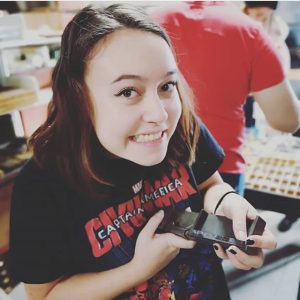
When I was fifteen, my cousin Blair came home after finishing his first mechanical engineering co-op term at UBC Vancouver. He showed me his report, proudly telling me about all the job experience he got before even getting his degree. That was the day I decided I wanted to apply for a co-op program.
Four years later, I was part way through my second year as an Arts student, with an affinity for creative writing, and I wondered “can I still do that with this degree?”
The answer to that question is heck yeah, and you can probably do it with your degree, too.
I’m currently writing this blog post during my first co-op term working at UBCO as a Digital Communications Assistant, a position I didn’t even know existed until I applied for it. I was worried about finding a position that would match my skills, but was pleasantly surprised to see the range of positions on the co-op job board.
I’ve been told by my family, friends, even my professors, that a degree in creative writing would limit my potential job opportunities. Co-op taught me the opposite — that creative writing helps me build communication skills, and that communication skills are essential in this age of digital media and technology.
Some common misconceptions about co-op
A lot of people expect co-op to just have opportunities for students studying business or similar fields, but at UBCO there are co-op opportunities in fields ranging from engineering to environmental science to communication to animation.
The co-op program office is really helpful about finding positions in a field that works for you. They actively seek out new co-op positions to expand the co-op program and the range of students who participate.
If you’re worried about not finding a position, you can book an appointment with a coordinator to see what potential job postings they may have in your field. You may even discover out-of-the-box opportunities in fields you hadn’t even considered before.
Personally, I applied to co-op hoping to work at a publishing house. I hadn’t even thought that my background in Creative Writing might be useful in a marketing job (like the one I have now), so if you’re thinking “how useful could my skill set be to employers?”, the answer is probably “more useful than you might think.”
“I’ve been told by my family, friends, even my professors, that a degree in creative writing would limit my potential job opportunities. Co-op taught me the opposite — that creative writing helps me build communication skills, and that communication skills are essential in this age of digital media and technology.”
What to expect from the co-op program
Here are just a few of the things the co-op coordinators do to prepare you for your work term:
- Hold meetings where they get to know you, ask about what kind of positions you’re looking for, talk to you about potential career paths, and give you alternate options you could explore.
- Organize workshops that will help you improve your job-searching skills (writing resumes and cover letters, applying for positions, going to interviews, networking etc.)
- Hold office hours each week to address your questions, and set aside time specifically to help with job searching and applications.
- Give you access to a job board specifically for co-op positions.
- Organize networking events where you can talk to potential employers.
How co-op has helped me
I’m not gonna lie to you — I took for granted the skills involved in writing a good cover letter and resume. Co-op has improved all my job-searching skills, from cover letters to interviews to thank-you letters.
I’m much more comfortable in a professional setting now than I ever dreamed I could be a year ago.
Co-op also taught me so much about the creative writing field. I came into this program expecting editing to be my primary career option, but the co-op coordinators opened my eyes to the importance of creative writing in marketing and professional communications as well. I feel much more confident about my skill set and how that translates to potential job opportunities.
Co-op is a great opportunity to explore your field. It gives you a chance to not only gain relevant experience, but also figure out what aspects of a particular role or field you like (and which ones you dislike).
One of the many perks of co-op is the potential for customization. You can find an opportunity you’re really interested in, and work there for all three terms, or you can explore new opportunities for each term.
If you aren’t too fond of your position’s responsibilities in your first work term, you can look at jobs with different responsibilities in your second and third work terms.
My experience with co-op has been even better than I expected after that first fateful conversation with my cousin. I encourage anyone who wants relevant work experience or is questioning their career path to apply for co-op.
If your degree is really specific and you’re worried there won’t be co-op positions in your field, don’t let that stop you! Contact the co-op program office to learn more about the options available to you, or check out coop.ok.ubc.ca to learn more (Engineering students should visit coop.engineering.ubc.ca).
Third-year students in Arts, Fine Arts, Human Kinetics, Management, Media Studies, and Sciences can apply to the co-op program before Sep 30.
Second and third-year students in Engineering can apply to the co-op program before Sep 13.
Are you a student at UBC’s Vancouver campus? Learn more about co-op opportunities at UBC Vancouver.
 About the author
About the author
Sarah Kloos is a Creative Writing major, a collector of cool rocks, and a lover of novels. She’s still not 100% sure what she’s going to be when she grows up, but for the moment, she’s okay with that. For now, she’s learning everything she can from her co-op work term, and loving every minute of it.